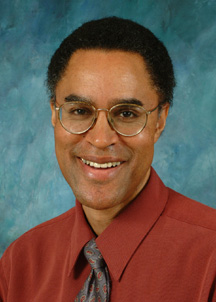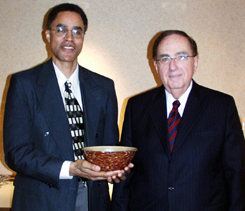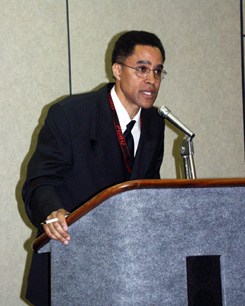 Walter Brooks’ life reflects his passion for diversity.
Walter Brooks’ life reflects his passion for diversity.
A media specialist in UNMC’s department of public affairs, the Vietnam veteran has handled baggage in a Seattle Greyhound bus station; taught English in Taiwan; lived with Buddhist monks in Thailand; beach bummed in Malaysia; promoted Omaha’s Great Plains Black Museum; washed dishes in a Mexican restaurant in Hawaii; and served as executive waiter to Microsoft billionaire Bill Gates.
Since 1999, he has focused on promoting UNMC within Omaha’s underserved communities, spotlighting campus minorities, pitching stories to local and national media and promoting cultural diversity at every turn.
For his commitment to diversity issues, Brooks received one of two 2002 Chancellor’s Diversity Awards for enhancing cultural competence and understanding at UNMC.
“Diversity, to me, is basically about communication,” Brooks said. “I’ve always wanted to experience many different cultures and people. My life has never been confined or defined by one racial group of friends.”
Brooks’ impact widespread
In addition to helping revitalize Martin Luther King Jr. Day and Black History Month celebrations on campus, “Walter has been almost solely responsible for increasing UNMC’s diversity coverage in UNMC Today and in the Omaha area news media,” his nominator said.
 |
UNMC Chancellor Harold M. Maurer, M.D., right, presents Walter Brooks with an original glass sculpture. |
Starting out
Born and raised in Seattle, Brooks found his calling when his high school English composition teacher said he had “exceptional writing talent.”
Upon graduation, the honors student attended the University of Washington for one semester, then “bored to death,” dropped out and joined the U.S. Marine Corps for three years. A 13-month stint in Vietnam redefined his life.
“Vietnam is where I began to question everything I had ever learned,” Brooks said. “How was I an honor student and I didn’t have a clue about the politics, history and economics that led to that war? Nothing had prepared me. I think that’s why the emphasis on my life since then has been far more on self-education than academic education.”
A voracious reader, Brooks has immersed himself in learning all he can about everything he can. “I never felt I needed a college degree to be the educated person I feel I am,” he said.
For years, he lived in the moment — traveling and immersing himself in different cultures. “That probably helped me the most in terms of receiving this type of award,” he said.
Professional path
 |
Walter Brooks emcees the recent NHS/UNMC Martin Luther King Jr. celebration. |
The book garnered the attention of Bertha Calloway, director of the Great Plains Black Museum in Omaha, who hired Brooks as a communication specialist in 1977. “That was a dream job,” said Brooks, a film aficionado. “I was paid to write about, talk about, research and communicate African American history.”
On the road again
In 1980, he began a seven-year stint at Mutual of Omaha’s corporate communications department. There, he co-founded the company’s first observance of Black History Month. Then, wanderlust struck again and Brooks decided to celebrate his 40th birthday in the sun. He moved to Hawaii without any job prospects, toting only his duffle bag, mountain bike and a roundtrip plane ticket that he cashed in the first week.
Within days, he became a dishwasher in a Mexican restaurant. Later, he worked as a night cook, bus boy and eventually a waiter at more exclusive resorts. In 1989, he returned to Seattle where he took writing classes, wrote for the local black press and, for nine months, served as an executive waiter at the Microsoft World Headquarters.
Then it was off to Taiwan — the first leg of a world trip. Brooks spent 10 months there teaching English, then moved to Thailand and Malaysia. In October 1991, he learned his mother had cancer and returned to Seattle. After her death in May 1992, Brooks once again returned to Hawaii and the food service industry.
Brooks: “UNMC is the ideal job for me”
In the fall of 1993, Brooks was planning a move to Brazil as a conversational English teacher when he stopped in Omaha to see longtime friend and mentor Ethel Johnson. When he discovered she was ill, he abandoned his plans and looked after her. Today, he continues to provide eldercare to Johnson, 91. Brooks was with ConAgra’s consumer affairs department for five years before coming to UNMC in September 1999.
Since then, he has promoted UNMC to young and old alike at community events in north and south Omaha. “UNMC is the ideal job for me now,” Brooks said. “I feel like all my life experiences and training have come together for my own career and service to multicultural communities.”